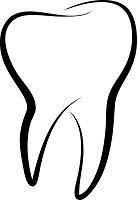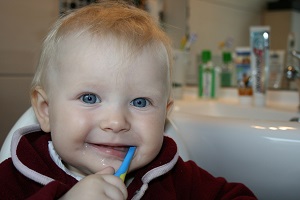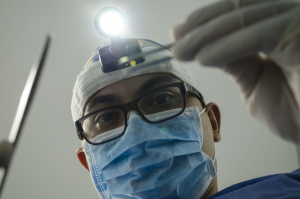Baby bottle tooth decay as a hidden danger
We all love our children – even if they sometimes become annoying when it is time to brush their teeth and go to bed. In such moments, many parents resort to giving the small ones a bottle to calm them down with a yummy fruit juice or warm milk. In most cases, this tactic works wonders, but, unfortunately, too many parents are completely uninformed about the potentially detrimental consequences that this approach can have on their kids’ teeth.What is baby bottle tooth decay?
The in all likelihood most negative side effect of the “pre-bed bottle” is the so-called baby bottle tooth decay which can develop very quickly and just as rapidly destroy a small child’s teeth. The risk of this condition emerging is especially high among children who drink multiple bottles of sweet juice and/or milk every day, given that the constant sucking on the bottle prevents their saliva from properly covering their teeth to neutralize acids. In such cases, even the most diligent brushing does not help. Dark-colored / discolored teeth are the most prominent indicators for baby bottle tooth decay and are nowadays no longer a rarity among young pre-school kids. And as if the danger of this condition was not concerning enough for parents and their small children, its growing precedence is even more concerning, given that the number of children affected by baby bottle tooth decay has unfortunately grown significantly and steadily over the past 5-10 years. According to the latest estimates, up to 50% of all cases of tooth decay among school kids are a direct result of baby bottle tooth decay in their younger years.
Besides making affected teeth look unaesthetic, baby bottle tooth decay can also cause a child pain during chewing and, thus, negatively affect his or her eating habits. Also, severely damaged teeth often have to be removed which can not only become painful and expensive but which can also cause a child’s permanent teeth to emerge in disadvantageous locations and directions out of the gum line. The resulting crooked teeth then end up with an unflattering look and have to be set straight later in the child’s life – usually via the use of costly and uncomfortable measures (e.g., permanent braces).
Why is baby bottle tooth decay such a huge problem?
One of the main reasons for the unfortunately quick spread of baby bottle tooth decay across Austria is the frequently encountered significant lack of knowledge about this dental condition among young parents. In general, roughly 10-15% of small children are affected by the disease country-wide but once we focus on the socioeconomically weaker segments of society, the disease prevalence rate jumps to a whopping 40%. Parents who are members of these social segments are often not aware of the fact that they should use fluoride tooth paste to brush their small children’s teeth to successfully combat tooth decay. Also, the very same parents are often the ones who give their children bottles filled with sweet juices or milk to lull them into sleep in the evening without brushing their teeth after those pre-bed meals. If such inadequate dental care goes on for too long, children end up with so severely damaged teeth that even their dentists cannot save them. Therefore, a crucial first step towards successfully preventing baby bottle tooth decay is the early education of young parents to ensure that they not only provide their children with the comprehensive dental care that they need but who also bring them to check up visits with a dentist early on before any baby bottle-related tooth decay can cause any significant damage.Over the past few years, an increasing number of dentists have pointed to another potential key factor driving the continued spread of baby bottle tooth decay – and that factor is the lack of dental health assessments by trained dentists early on in a child’s life. Nowadays, according to the latest list of preventative services established and maintained by Austrian insurers, dentist visits for small children are recommended and covered only when they get close to their third life year. Kids who are younger than that rely on their pediatricians for early recognition of any potential dental problems. However, since recent surveys have shown that only 30-40% of parents receive information about the dental health of their children from pediatricians, many dentists have started advocating for expanded insurance coverage for dental check up visits for kids once they pass the six months mark. The argument in favor of this change is that early dental care and issue detection can not only improve a child’s quality of life but can also reduce care expenses for insurers by preventing otherwise necessary dental treatments. Unfortunately, Austrian insurers have so far not been receptive to this line of reasoning.
How can I prevent baby bottle tooth decay?
Since baby teeth are significantly more susceptible to tooth decay than permanent teeth, given their relatively weaker enamel, parents should start with careful dental care immediately when the first baby teeth emerge out of the child’s gum line. The early application of fluoride tooth paste is particularly important – despite many pediatricians’ advice to wait with its use until a child reaches the age of three. Additional measures that can help with the prevention of baby bottle tooth decay include the following:- Give your baby bottles with water instead of sweet juice or milk (during the day and at night)
- Clean your baby’s teeth and gums with a moist towel after every meal
- Nurse your baby only during the day and prior to brushing his/her teeth in the evening
- Do not dip pacifiers in honey or sugar
- Teach your baby to drink out of a sippy cup instead of out of a bottle as early as possible
Alright then – there definitely is hope for meeting baby bottle tooth decay head on – but only with thorough dental care, so let’s get to it!

In the meantime, we would love to hear from you – please leave any thoughts and feedback in the comment box below and subscribe to our blog for free at any time.


